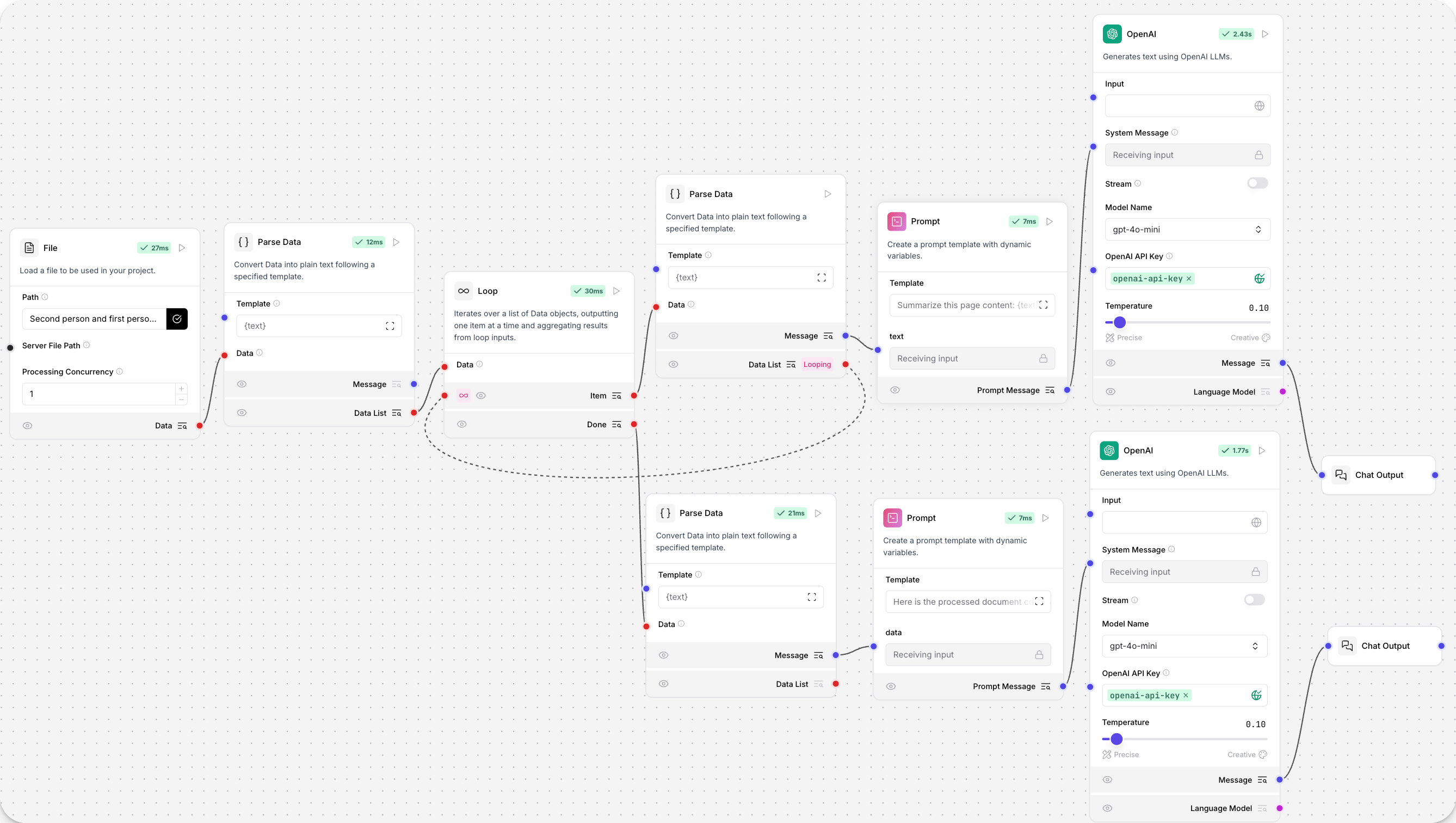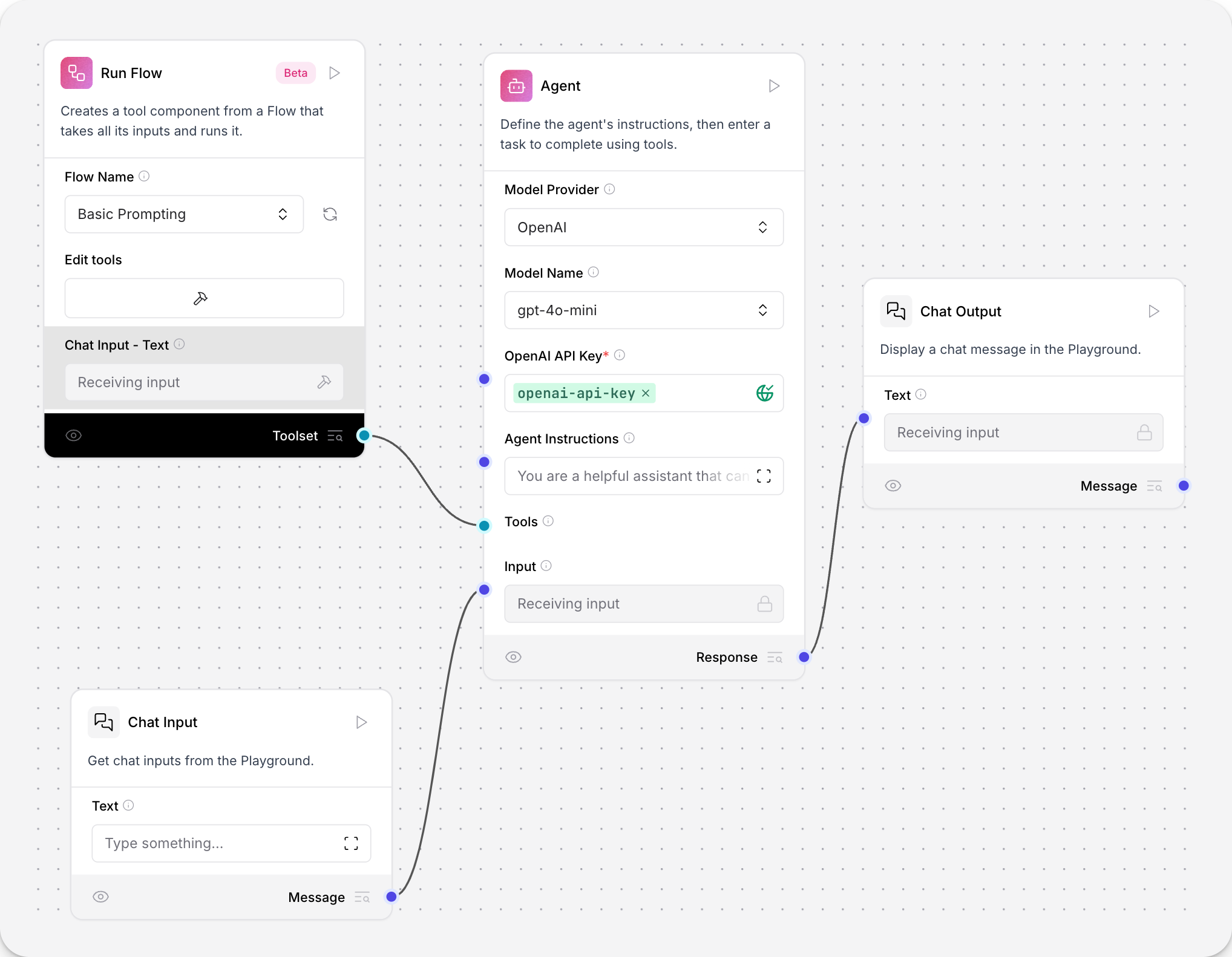Logic components in Langflow
|
This Langflow feature is currently in public preview. Development is ongoing, and the features and functionality are subject to change. Langflow, and the use of such, is subject to the DataStax Preview Terms. |
Logic components provide functionalities for routing, conditional processing, and flow management.
Use a logic component in a flow
This flow creates a "for each" loop with the Loop component.
The component iterates over a list of Data objects until it’s completed, and then the Done loop aggregates the results.
The File component loads text files from your local machine, and then the Parse Data component parses them into a list of structured Data objects.
The Loop component passes each Data object to a Prompt to be summarized.
When the Loop component runs out of Data, the Done loop activates, which counts the number of pages and summarizes their tone with another Prompt.
This is represented in Langflow by connecting the Parse Data component’s Data List output to the Loop component’s Data loop input.

The output is similar to the following:
Document Summary
Total Pages Processed
Total Pages: 2
Overall Tone of Document
Tone: Informative and Instructional
The documentation outlines microservices architecture patterns and best practices.
It emphasizes service isolation and inter-service communication protocols.
The use of asynchronous messaging patterns is recommended for system scalability.
It includes code examples of REST and gRPC implementations to demonstrate integration approaches.Conditional router (If-Else component)
This component routes messages by comparing two strings.
It evaluates a condition by comparing two text inputs using the specified operator and routes the message to true_result or false_result.
Parameters
| Name | Type | Description |
|---|---|---|
input_text |
String |
The primary text input for the operation. |
match_text |
String |
The text input to compare against. |
operator |
Dropdown |
The operator to compare texts. Options: "equals", "not equals", "contains", "starts with", "ends with", "regex". Default: "equals". |
case_sensitive |
Boolean |
If true, the comparison is case sensitive. This setting is ignored for regex comparison. Default: false. |
message |
Message |
The message to pass through either route. |
max_iterations |
Integer |
The maximum number of iterations for the conditional router. Default: 10. |
default_route |
Dropdown |
The default route to take when max iterations are reached. Options: "true_result" or "false_result". Default: "false_result". |
| Name | Type | Description |
|---|---|---|
true_result |
Message |
The output when the condition is true. |
false_result |
Message |
The output when the condition is false. |
Operator behavior
The If-else component includes a comparison operator to compare the values in input_text and match_text.
All options respect the case_sensitive setting except regex.
-
equals: Exact match comparison.
-
not equals: Inverse of exact match.
-
contains: Checks if match_text is found within input_text.
-
starts with: Checks if input_text begins with match_text.
-
ends with: Checks if input_text ends with match_text.
-
regex: Performs regular expression matching. It is always case sensitive and ignores the case_sensitive setting.
Component code
conditional_router.py
404: Not FoundData conditional router
|
This component is in Legacy, which means it is no longer in active development as of Langflow version 1.3. Use the Conditional router component instead. |
This component routes data objects based on a condition applied to a specified key, including boolean validation.
Parameters
| Name | Type | Description |
|---|---|---|
data_input |
Data |
The data object or list of data objects to process. |
key_name |
String |
The name of the key in the data object to check. |
operator |
Dropdown |
The operator to apply for comparing the values. |
compare_value |
String |
The value to compare against (not used for boolean validator). |
| Name | Type | Description |
|---|---|---|
true_output |
Data/List |
Output when the condition is met. |
false_output |
Data/List |
Output when the condition is not met. |
Component code
data_conditional_router.py
404: Not FoundFlow as Tool
|
This component is deprecated as of Langflow version 1.1.2. Instead, use the Run flow component. |
Parameters
| Name | Type | Description |
|---|---|---|
flow_name |
Dropdown |
The name of the flow to run. |
tool_name |
String |
The name of the tool. |
tool_description |
String |
The description of the tool. |
return_direct |
Boolean |
If true, returns the result directly from the tool. |
| Name | Type | Description |
|---|---|---|
api_build_tool |
Tool |
The constructed tool from the flow. |
Component code
flow_tool.py
404: Not FoundListen
This component listens for a notification and retrieves its associated state.
Parameters
| Name | Type | Description |
|---|---|---|
name |
String |
The name of the notification to listen for. |
| Name | Type | Description |
|---|---|---|
output |
Data |
The state associated with the notification. |
Component code
listen.py
404: Not FoundLoop
This component iterates over a list of Data objects, outputting one item at a time and aggregating results from loop inputs.
Parameters
| Name | Type | Description |
|---|---|---|
data |
Data/List |
The initial list of Data objects to iterate over. |
| Name | Type | Description |
|---|---|---|
item |
Data |
Outputs one item at a time from the data list. |
done |
Data |
Triggered when iteration complete, returns aggregated results. |
Component code
loop.py
404: Not FoundNotify
This component generates a notification for the Listen component to use.
Parameters
| Name | Type | Description |
|---|---|---|
name |
String |
The name of the notification. |
data |
Data |
The data to store in the notification. |
append |
Boolean |
If true, the record will be appended to the existing notification. |
| Name | Type | Description |
|---|---|---|
output |
Data |
The data stored in the notification. |
Component code
notify.py
404: Not FoundPass message
This component forwards the input message, unchanged.
Parameters
| Name | Display Name | Info |
|---|---|---|
input_message |
Input Message |
The message to be passed forward. |
ignored_message |
Ignored Message |
A second message to be ignored. Used as a workaround for continuity. |
| Name | Display Name | Info |
|---|---|---|
output_message |
Output Message |
The forwarded input message, unchanged. |
Component code
pass_message.py
404: Not FoundRun flow
This component runs a specified flow within a larger workflow with custom inputs and tweaks.
The Run Flow component can also be used as a tool when connected to an Agent. The name and description metadata that the Agent uses to register the tool are created automatically.
When you select a flow, the component fetches the flow’s graph structure and uses it to generate the inputs and outputs for the Run Flow component.
To use the Run Flow component as a tool, do the following:
-
Add the Run Flow component to the Simple agent flow.
-
In the Flow Name menu, select the sub-flow you want to run. The appearance of the Run Flow component changes to reflect the inputs and outputs of the selected flow.
-
On the Run Flow component, enable Tool Mode.
-
Connect the Run Flow component to the Toolset input of the Agent. Your flow should now look like this:

-
Run the flow. The Agent uses the Run Flow component as a tool to run the selected sub-flow.
Parameters
| Name | Type | Description |
|---|---|---|
input_value |
String |
The input value for the flow to process. |
flow_name |
Dropdown |
The name of the flow to run. |
tweaks |
Nested Dict |
Tweaks to apply to the flow. |
| Name | Type | Description |
|---|---|---|
run_outputs |
List[Data] |
The results generated from running the flow. |
Component code
run_flow.py
404: Not FoundSub Flow
|
This component is deprecated as of Langflow version 1.1.2. Instead, use the Run flow component. |
This component integrates entire flows as components. It dynamically generates inputs based on the selected flow and executes the flow with provided parameters.
Parameters
| Name | Type | Description |
|---|---|---|
flow_name |
Dropdown |
The name of the flow to run. |
| Name | Type | Description |
|---|---|---|
flow_outputs |
List[Data] |
The outputs generated from the flow. |
Component code
sub_flow.py
404: Not Found